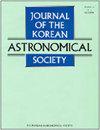基于太阳x射线耀斑数据的神经网络预测noaa尺度太阳质子事件
IF 0.8
4区 物理与天体物理
Q3 ASTRONOMY & ASTROPHYSICS
引用次数: 1
摘要
本文利用1976 - 2011年GOES太阳x射线耀斑数据,利用神经网络方法中的多层感知器(MLP)建立了一套NOAA尺度的太阳质子事件(SPE)预报模型。我们的MLP模型是第一次尝试用神经网络方法预测SPE尺度。输入数据采用x射线耀斑等级、脉冲时间和位置的组合。在这项研究中,我们通过改变层数和节点数以及输入数据的组合进行了多次试验。为了找到最好的模型,我们使用由SPE量表加权的f分数的总和,其中f分数是PODy(召回率)和精度(正预测值)的调和平均值,以尽量减少遗漏和误报。我们发现MLP模型比多元线性回归模型要好得多,其中单层MLP模型的效果最好。本文章由计算机程序翻译,如有差异,请以英文原文为准。
FORECAST OF SOLAR PROTON EVENTS WITH NOAA SCALES BASED ON SOLAR X-RAY FLARE DATA USING NEURAL NETWORK
In this study we develop a set of solar proton event (SPE) forecast models with NOAA scales by Multi Layer Perceptron (MLP), one of neural network methods, using GOES solar X-ray flare data from 1976 to 2011. Our MLP models are the first attempt to forecast the SPE scales by the neural network method. The combinations of X-ray flare class, impulsive time, and location are used for input data. For this study we make a number of trials by changing the number of layers and nodes as well as combinations of the input data. To find the best model, we use the summation of F-scores weighted by SPE scales, where F-score is the harmonic mean of PODy (recall) and precision (positive predictive value), in order to minimize both misses and false alarms. We find that the MLP models are much better than the multiple linear regression model and one layer MLP model gives the best result.
求助全文
通过发布文献求助,成功后即可免费获取论文全文。
去求助
来源期刊

Journal of the Korean Astronomical Society
地学天文-天文与天体物理
CiteScore
1.30
自引率
10.00%
发文量
0
审稿时长
>12 weeks
期刊介绍:
JKAS is an international scientific journal publishing papers in all fields of astronomy and astrophysics. All manuscripts are subject to the scrutiny of referees. Manuscripts submitted to JKAS must comply with the ethics policy of JKAS. Six regular issues are published each year on February 28, April 30, June 30, August 31, October 31, and December 31. One year''s issues compose one volume.
 求助内容:
求助内容: 应助结果提醒方式:
应助结果提醒方式:


